UP TO THE MINUTE
Joshua Engelbrecht - Find Labor Fast by Phone or Web - PODCAST TRANSCRIPTION
April 26, 2023 at 6:00 a.m.Editor's note: The following is the transcript of a live interview with Josh Engelbrecht, CEO of ToolBelt. You can read the interview below or listen to the podcast.
Heidi J. Ellsworth: Hello and welcome to another MetalCast from Metal Coffee Shop. My name is Heidi Ellsworth and we're here to talk about everything metal. We want to know what's happening out there, and as everyone knows, one of the big conversations, no matter what part of construction you're in, is about the labor shortage. So we have brought an expert on today to talk about what are some solutions, Hey, how often do you hear that, solutions to help with the labor shortage. So I am honored to welcome Josh Engelbrecht with ToolBelt. Josh, welcome to the show.
Joshua Engelbrecht: Hey, I really appreciate you having me, Heidi. Excited to be here today.
Heidi J. Ellsworth: I'm really excited. I love technology, love it, especially when it's talking in the construction realm. And we all know that's going to be the solution for us, for the labor shortage going forward. And you've done so much. So before we get started on that topic, which is we're going to go deep, if you could introduce yourself and tell us a little bit about ToolBelt.
Joshua Engelbrecht: Oh, that's great. Yeah, for everyone watching, my name's Josh Engelbrecht. I'm CEO and founder at ToolBelt. My background has been largely in our industry my entire career. So I started off basically as a general contractor doing a lot of exterior remodeling and even got into custom home building. And one of the biggest challenges I faced was, how do you find good quality crews, whether it's subcontractors or even your individual installers. And when I took a step back and really looked at, how are we finding these people and how are these great crews finding me, I realized it was all word of mouth I'd have to call Heidi to call Chad to call Mark and eventually kind of get back to me.
And what I realized was a lot of the crews were really skilled at their trade and not at the trade of business, and they relied on a lot of established networks to find people and whatnot. And so I realized there was no central place for people to find each other, right?
Heidi J. Ellsworth: Right.
Joshua Engelbrecht: We did Indeed. We tried ZipRecruiter, tried Craigslist, and all of them were really unsuccessful. And I realized if there was a tool and if the contractors could use our technology as if it was a tool that could connect contractors, builders, people that need labor to skilled labor or tradespeople, installers, or even subcontractors, that actually on both sides could do more work. And that's what we've successfully built here at ToolBelt.
Heidi J. Ellsworth: That's great. Wow. We need those connections. There's been such a change in the industry, in home improvement, roofing for sure over the years, where 20 years ago, there weren't a lot of sub crews, but today that is one of the main sources of labor for so many of our home improvement companies. And so to get that connection, it's just never been there before, this software has really made the difference. Tell us a little bit about where you are today with the software. What's happening and what's some of the feedback you're getting from crews and from contractors?
Joshua Engelbrecht: Yeah. Well, our product has definitely evolved over the years. For context for everyone, we started in late 2019 going to market. We went mobile first just because there's not many laptops on roofs and everyone kind of had a phone and that's when the smartphones, everyone started using apps and whatnot. And then primarily our business is we have to build a two sided marketplace. So it's kind of like a Uber, Airbnb and DoorDash. You got to have people that need labor and you have to people that need work. And so we really focused on the Pacific Northwest at first for the first year and a half. And then actually indeed.com approached us from a business partnership lens and actually became a small investor in my business and helped us expand across the west. So a lot of people went to the West company.
And now we actually service largely even a little bit more, at least 50 of the top metro markets across the United States. I'm going to be expanding to more markets. We even help contractors and small areas in Montana find crews. But the feedback that we've gotten at ToolBelt, what we always try to focus on is how do we reduce the friction? How do we build technology that mimics the existing word of mouth process for both parties? And I think largely that's why we've been successful, because a lot of tech companies in our space, they build software for the large guys and they're really important. We have a lot of great relationships with them.
But that your CRMs and ERPs, those are really complex pieces of software and software doesn't have to be like that. So at ToolBelt, we've taken a lot of time and we start with the customer and work backwards. So we started with the installer and tried to build technology that was super helpful for the installer, so he felt empowered to use our software and with literally two clicks, you can find the contractor that you need to connect with. And so we do thousands of those connections across the country every day.
Heidi J. Ellsworth: Wow. And you do both individuals and crews, right?
Joshua Engelbrecht: Yeah, correct. So we have two user types on our platform. So you're either a licensed contractor and that varies by states. In California, you have to basically pass the bar exam to get a contractor license there. In Texas, it's the opposite side of the coin. And so by whatever state or municipality, you have to have a license requirement. And then if you're not licensed, you have a trades person and there's plenty of installers out there. And part of the big issue and ToolBelt's a really key part in this whole labor solution component, but you always hear that our industry's like, "We're 50,000 installers short or 100,000." And I was in the Army back in the day, and I always make this analogy of like, "Okay, let's say in California you're 1,000 roofers short, and we paratroop in 1,000 roofers, how are you going to place them?"
So part of the issue in our industry is, in order to be placed, you have to be found and there is no network for people to be found. And that's really what ToolBelt, what we try to be is, if I'm the best roofer in Scottsdale, Arizona and my wife gets a job in Seattle, how do I move and be found that I am good? And with ToolBelt, you can have that profile as an individual installer and promote yourself. And we're big on everyone being inclusive and trying to make sure that everybody, whether you've had 40 years experience in this industry or you're just trying to get started, you can be found on our platform.
Heidi J. Ellsworth: Yeah, oh, I love that. And you said it started out as an app on the phones, but you have a big announcement coming out right now that it is now available both on desktop or computers, online, I should say, the right thing, and app. Tell us about that. That's a great innovation.
Joshua Engelbrecht: It is. I appreciate that. Yeah, you heard it here first. So we've had a web application that we've been working with a lot of our close clients on and gathering the feedback and basically whether it's mobile or desktop, it's for different customers. So what we found is our larger customers, they really wanted a desktop solution, but they wanted it simple because it's quick to go down Scope Creek. All of a sudden you start developing all these features that don't really reduce the friction. So what we've done is we've launched in our web app to where people can be able to soon, they will be shortly here, it'll be in April, it's going to be launching, you're going to be able to go onto our website, log in, create an account, and then have that seamless experience to find the crews that you need. And so we're really excited to be able to launch the account creation feature for our web app.
Heidi J. Ellsworth: Well, and I think that to what you said earlier, that brings it all together. Again, because you have a number of people who are working in an office day-to-day, recruiters, HR, business owners, who they're at their computers all day long and the phone is kind of over here. We're doing a few texts and stuff, but they want to do most of their business here. Whereas when you're out in the field, you're doing it on your phone and you're there. So now with this, you've really included everyone to be able to get onto the same platform.
Joshua Engelbrecht: 100%. And we took a year plus and really just we'd go to their offices and see how they currently try to find crews and how they're currently posting, how they're currently managing their jobs. So, we've had spent hundreds of hours observing and getting the feedback and we've really nailed it with what we've built based on putting that out with our existing customers. So its really user-friendly and it's easy for anyone to step in and start using in case you get a new production manager, someone gets promoted and anyone in the back office can use our software. And it's not complex at all. It's literally designed to be point and click. So we're really excited.
Heidi J. Ellsworth: I think that's great. You said something earlier that I just want to touch on again and is that being found and do we have as large a labor shortage as we think, or is it just we're not looking in the right places? I think of all these kids coming out of college, and I've talked to so many young people who are like, "I can't find a job." And I'm like, "Do you know how many jobs are out there and how much you're wanted?" But there's just that connection hasn't been made. So really to be able to connect both individuals and crews with the roofing industry in one place, and not just roofing, I know you do everything, and let's talk about that a little bit too, but to be able to get across all of construction, especially exteriors, that's a huge step in the right direction.
Joshua Engelbrecht: It really is. If you look at nursing or accounting or any other career fields, it's like, "Okay, I have to go to college for this and then when I'm done, I'm going to be able to go on Indeed, or I can go on ZipRecruiter, I can create a LinkedIn account." And so there's all these processes and platforms that are built out and then in our industry, its not and it's a lot of on-the-job training, which is really the best way to learn. But you can't really go to college for how to put a standing seam mount roof on. You literally have to be... There's theory, but then there's like, "Okay, you actually have to do it."
And still nevertheless, you need to have a platform that you can promote your skillset so you can actually showcase to your local community that you do have the skills and then therefore you could be more marketable and you could get paid more. And right now it's just all word of mouth and just that's your resume. It's just who you know and sometimes who can't keep you steadily busy because they're seasonalities. And so there's a lot of our smaller contractors or installers, they'll get laid off during the slower season. They don't know where to go because they've been on a roof from 7:00 AM to 7:00 PM. I think a tool belt is kind of the place where good contractors come to find work, where there's gaps in their schedule.
Heidi J. Ellsworth: Right. That's I think a really key point is, and we're going to see this, certain parts of the country, whether it's due to snow or whether it's due to the economy, small roofing companies can find work in other parts of the country if they want to travel or maybe even in their own area, working with other more GCs or larger roofing companies.
Joshua Engelbrecht: Yeah, no, I agree. And it's going to provide a lot of flexibility and mobility for a lot of the people in our space, not just in roofing, but just for those that are listening, we do the entire critical path. So we're in foundation, framing, fencing, decking, roofing, and then we even have what we classify as specialties. So we all know roofing's not roofing, a shingle crew is completely different than a flat crew, it's different than a metal crew. And then there's even different metal. On ToolBelt, we track that data and people can actually select what specific traits they do.
Heidi J. Ellsworth: Perfect. Because we are on Metal Cast and we like to talk about metal. So let's talk about that. ToolBelt is part of the Metal View Program with Sherwin Williams and you have, as is Metal Coffee Shop and some great things because if there is an overall labor shortage, there is a definite labor shortage in the skilled or specialty trades, metal, slate, tile, all of those. So on the metal front and you say you're tracking that data, what are you seeing in your platform for individuals and crews that are doing metal?
Joshua Engelbrecht: Surprisingly there's more people than you would probably think that are creating profiles, classifying themselves that they do metal. But how we track the success of that is seeing their gallery work in photos. A lot of people are uploading that content so that way when they contact somebody or someone contacts them on our platform, they can actually see some of the installs that they've done. And you can tell these are actually their pictures because the photos usually taken sideways. We've seen a lot of great quality work on there. So I personally think, except for a lot of your mechanical, electrical and plumbing trades, not crews or subs, but the individual trades people, I think the labor shortage is just more magnified by the inadequate ways that we find each other. That's my personal opinion and we have a lot of data that supports that.
That was always my hunch as a contractor starting this because you would have some people listening to us hear this all the time, if you reach out to a crew and, "Oh, I'm slammed, I'm busy for the rest of the month or summer," and then they call you back two weeks later, "Hey, do you still have that job?" And so, I kind of realized how the dynamics work, but with metal in a lot of the specialty roofing trades, we have a lot of crews and a lot of individuals on here that actually do, do that. And that's the value that we bring the industry is we are that central place that can capture that data and be able to connect both sides and also work with a lot of manufacturers as well and say, "Hey, we have a labor force here in your market, you should reach out to them for training opportunities." We've done that successfully with a lot of OEMs across multiple trades.
Heidi J. Ellsworth: When you talk about cross trades, when we're talking about Metal Coffee Shop, roofing, siding, metal buildings, gutters, there's so many things and people can search on your platform across the board for all types of metal construction, right?
Joshua Engelbrecht: Yeah. Correct. Whether it's siding, whether it's roofing. And so the whole gamut is available on our platform from a training standpoint.
Heidi J. Ellsworth: Yeah. As you're talking to some of these individuals who are doing metal, crews who are doing metal, metal contractors who are finding their crews, what's some of the feedback that you're hearing?
Joshua Engelbrecht: They like how easy it is to use and I think everyone says that about our software, but there's literally four buttons on ours, so it's pretty point and click. And so they really like that. They like the ability to personally brand, but I think the biggest reason why contractors love using our platform is we don't get in the way of you connecting with the people. When you come on, what a lot of the feedback we like is you can go on and let's say you're looking for a internal metal crew, Heidi, right?
And you post the projects and you post on our platform that you're looking for these type of individuals and I apply to you. On our app, how it works is, if I click apply, I can actually call or text you right directly. I think when you think about reducing the friction, that's mainly the feedback because we don't try to get in the way. I think we've all had apps like that where it's just like, "I can't find my Uber driver, I wish I could just call him." And it's like a message through here and do all that. We don't take that. We want keep that experience, because our ultimate goal is to connect these people for long-term relationships. My goal is I want you off our platform, because I want you working, because that means our overall economy is actually getting bigger because you're actually doing work.
Heidi J. Ellsworth: I want to touch on metal view too because a lot of people have been like, "Well how does that work?" And ToolBelt is part of the overall industry resources that Sherwin William have brought together. So once you have connected with Sherwin Williams and then you have connected with your metal manufacturer, then all of these resources come into play and you are working with a number of those manufacturers, right?
Joshua Engelbrecht: Yeah, I think what Mark McDonald has put together with that program is very, what's the word I want to use, very transformative. I don't even want to call it really disruptive because I think whether you're a home improvement company or even you're a existing metal contractor, you can take advantage of a lot of those resources that are in the Metal View Program. And I think he's done a great job putting together really an ala carte solution for either that will amplify current metal roofing contractors to grow their business. Whether that's through additional sales training, whether that's through streamlining measurements with their partners over at EagleView, and then where we just play, just a key component is, yeah, your sales is growing, we can help you find the individual installers or subcontractors to actually match that.
But I think what Sherwin Williams put together in a lot of collaboration with a lot of the OEMs in the space, with that program, is going to be really beneficial to allow new contractors that maybe don't do metal roofing, that would love to be able to get in there, to actually take advantage of these resources all in one shop. And we're just excited to play one key part of that and being able to say, "Hey, we can help you find the crews, so don't let that stop you from getting in this." Because a lot of customers want metal and a lot of these exterior companies would love to lead with metal, but they're limited on, I don't know how to measure this, I don't know how to train my guys to sell this. I don't have a manufacturer, I don't have a distributor. And that program provides a holistic solution really for any contractor that whether you're in roofing or not, I think you should really take advantage of.
Heidi J. Ellsworth: Yeah, I agree. And to get into that, to get all the services, to really be able to take your business that next level, selling it, and this just hasn't happened before with metal. It's always been kind of a one-off as they go and there's amazing metal companies out there. But to really take it to that next level of one call close and having the crews available to be able to meet the demand, we see the demand out there for metal, we see it and we see it through the surveys and reports.
Joshua Engelbrecht: I think where Metal was at is, it's kind of probably similar to how roofing was too. You still have your individual roofing companies that just do that. But then a lot of these exterior companies that really try to go for after, be proactive in the market and getting customers and really trying to deliver a great customer experience and on the whole exterior envelope. I just think we've seen it evolve. Shingles was that way, siding was that way, windows was that way and now it's not. And I think metals just starting to get there. You see it in solar, we're big in solar, large solar companies, solar's getting into roofing. And so I think you're going to continue to see this evolution evolve because our industry is evolving, so you just have to embrace it and all these solutions are really, makes it more light lifting. Why would you only want to do four roofing jobs a week, if you could do eight, if you could service more customers at the same quality, why would you not want to do that as a business owner?
Heidi J. Ellsworth: Yeah, exactly. You have everything. You have your foundation, you have your systems and processes. Now it's just about bringing in more customers and having the labor to install it, which is always the important part. So there's kind of two things. One, if you are interested in getting into the metal sales and getting into Metal View, like we said, first step, Sherwin Williams, participating manufacturers, and then you will have all these resources including ToolBelt, to kind of kick you off and take you to that next level. For other metal companies out there, metal, siding, roofing, who maybe are not doing Metal View but just want to get onto ToolBelt, how do they do that, Josh?
Joshua Engelbrecht: Yeah, So you can go onto the app store right now and type in ToolBelt and well we'll come up here. We got fantastic reviews, 4.5 stars on both, really great feedback and it takes about 60 to 90 seconds to create an account and then depending on how detailed you want to go, it's available in English and Spanish as well. Our app also offer translates, actually it's available in like five or six languages now. But if you're a metal contractor that is looking for whether it's subcontractors or your individual installer, so you can hire W2 in house, we have a plethora of individual tradespeople or crews that can meet that criteria.
So 60 seconds, download it, here in April, we'll do a big announcement here that our web app account creation. So right now we're going to be going through a little bit of a redesign on our website. We have our current or older website, right now, we're in the middle of coding a new one that's going to kind of have that easy experience to get people to sign up, but it is going to be pretty straightforward. So you go to mytoolbelt.com or you go to the app store and type in ToolBelt.
Heidi J. Ellsworth: That's great. And like you said, it's easy, so try it, go check it out. So if you're a siding contractor listening to this, doing metal siding right now, you may get some folks who are from the painting industry, who are looking to getting into metal. So it's the amount of resources out there are for all construction, all exteriors. And so it's going to offer an opportunity to bring some new people into your different industries also, which I think it's very cool.
Joshua Engelbrecht: Yeah, we do have a networking component that's really easy to use where you can connect with these different trades. And one of the biggest success stories we've seen is a lot of contractors have been able to pick up additional work by networking with other people that are either part of the critical path after or before. So if you think about in simple terms, I'm a siding contractor, I'm putting on fiber cement. Well if I'm a painting contractor, why would I not try to connect with every siding company? Because everything that gets put on a wall needs to be coated with something. If I'm a roofer, why would I not try to connect with any framer? Because everything that they frame has to have sheathing, it has to have a roof on.
So there is a big networking component on ToolBelt that people can leverage for free. And so it's not, you're sitting at home at night watching the game, watching March Madness right now and if you download ToolBelt, you can start thumbing through and you start connecting to people in your area and start growing your relationships. And that's really what our industry is about, is about growing relationships and that's what our platform does better than anything else.
Heidi J. Ellsworth: Connecting all the trades.
Joshua Engelbrecht: Yeah, all the trades.
Heidi J. Ellsworth: Yeah. I love it. Well Josh, congratulations. Thank you so much. For everyone out there, you can find ToolBelt, of course on Metal Coffee Shop. They have a full directory, you can find information and you can find that information within the Metal View Program. Josh, again, thank you for being on MetalCast, we're thrilled to have you.
Joshua Engelbrecht: I appreciate it. Thanks for having us, Heidi, and I appreciate everything you do for our industry, so thanks again.
Heidi J. Ellsworth: Thank you. And thank you all for watching and listening. This is the kind of information we're trying to bring to help your business grow, to really solve some of the problems that are out there. So be sure to check all of our MetalCasts under our Re-Listen Watch, under podcasts and MetalCasts and also our webinars under Metal Talk. So we will be back with you next week with another episode of MetalCast. Be sure to go to your YouTube channel and to your favorite podcast channel, subscribe and hit those notifications so you don't miss a single episode. We'll be seeing you next time on MetalCast.


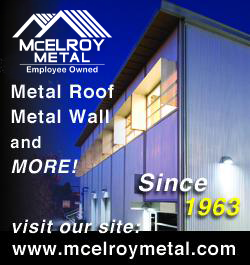
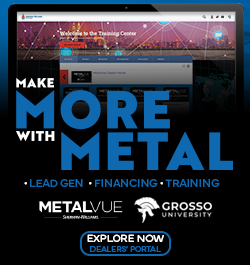
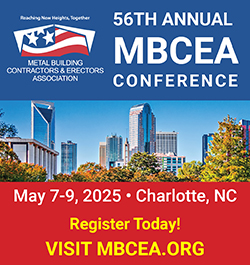








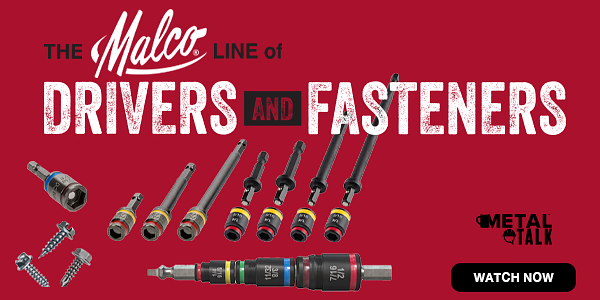

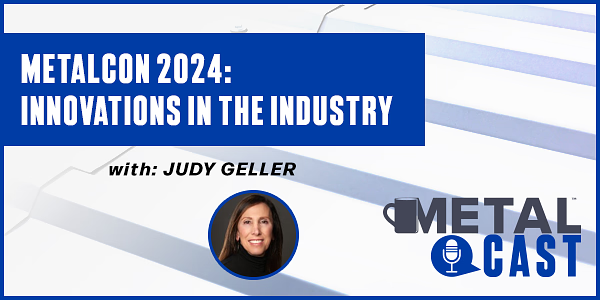





Comments
Leave a Reply
Have an account? Login to leave a comment!
Sign In